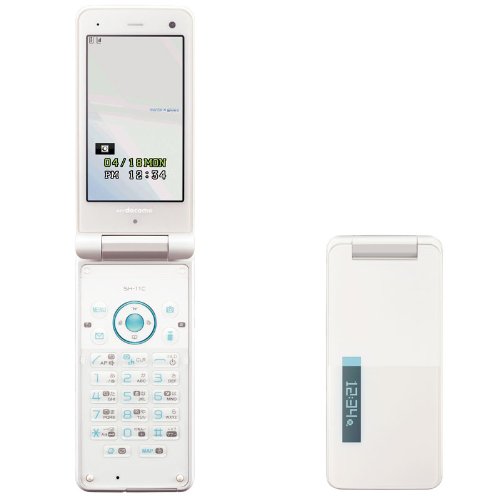
Generally it’s nice to have your country or town be number one in something. Even if it’s for something as despicable as bag snatching, you can at least gain a slightly twisted sense of pride for toughing it out in such a rough-and-tumble locale.
However, when a recent study reported by Bloomberg Japan declared that Japan had overtaken the U.S. in smartphone and tablet app purchases, people we less than enthused leaving comments such as “Japan’s screwed,” and, “This is sad news indeed.”
Japan had a rather rough transition into the smartphone world. About a decade ago the nation was once heralded as a magical utopia of mobile phone technology which provided such luxuries as a camera, TV, and (limited) internet access. However, these phones were isolated and bound to the extensive Japanese infrastructure that was built for them.
These phones were unable to adapt to the global market and earned the moniker “Galapagos phones”after the islands of the same name. This unique situation caused a slight delay for the entrance of smartphones to the Japanese market compared to the rest of the world. Still, the country was able to catch up quickly – and then some.
According to the report compiled by App Annie, in October 2012, app sales in Japan were roughly 60% that of the U.S.A. However, at the exact same time the following year, app revenue from Japan had tripled and moved it securely into the top spot, pushing the U.S. down to number two.
To give a further sense of scale, the amount of revenue acquired from Japan for apps and in-app purchases was three times that of South Korea and six times the money spent in the United Kingdom. Even the top grossing companies were in Japan–they were ranked in the report as Gung Ho Online Entertainment (Puzzle & Dragons), Line, Colopl (Quiz RPG Mahotsukai to Kuro Neko No Wiz), Sega Sammy, and Namco Bandai (Taiko No Tatsujin).
Many of the top-grossing games follow the model in which they are free to play but packed full of potential “micro-transactions,” asking for money to purchase upgrades which expand the game or allow you to progress more quickly.
Experience with mobile phones may have had a part in Japan’s sudden embrace of apps. During the Galapagos phone years, people in Japan had already become well-accustomed to purchasing special features for their phones such as dictionaries and games. By the time iTunes and Google Play hit the scene they were already second nature to a lot of people.
You might think that becoming the world leader in something like this would be a positive thing. In a way it’s a good sign of economic activity, much like how China is steadily becoming more of a major market for motion pictures. However, netizens in Japan showed very little optimism over claiming the top spot for app buying.
Here are some of their comments.
“I’m not all that proud.”
“Eh, either way is fine.”
“S#%%%%%%%%%t.”
“This is kind of embarrassing for Japan.”
“What’s fun about juvenile apps?”
“That Pokémon rip-off Puzzle & Dragon is selling?”
“We should be ashamed of ourselves.”
Among the negative, there were a few comments along the lines of “Hooray for Japan! We’re number one in something!” but they were few and far between. It should be noted that the data App Annie based their study on were not published, which might raise a few eyebrows.
Still, in light of this news, I’m going to make some last-minute changes to that app I’ve been working on:
I just know it’ll be a big seller!
Source: Bloomberg via Hachima Kiko (Japanese)
Top Image: Amazon
Mobile Phones Image: Amazon
Puzzle & Dragons Image: Amazon
Eagle Image: Wikipedia – Saffron Blaze




 You beautiful fatty! — Doraemon character teaches us to speak nicely with new smartphone app
You beautiful fatty! — Doraemon character teaches us to speak nicely with new smartphone app Japan Self Defense Forces hoping to entice new recruits with… dancing avatar smartphone app
Japan Self Defense Forces hoping to entice new recruits with… dancing avatar smartphone app Flipping genius? Japan is getting a new flip phone/smartphone hybrid【Photos】
Flipping genius? Japan is getting a new flip phone/smartphone hybrid【Photos】 Some of Japan’s COVID-19 contact tracing apps haven’t been working since last September
Some of Japan’s COVID-19 contact tracing apps haven’t been working since last September Nintendo Shares Drop 18% After It Reminds Investors It Did Not Develop Pokémon Go
Nintendo Shares Drop 18% After It Reminds Investors It Did Not Develop Pokémon Go McDonald’s new Happy Meals offer up cute and practical Sanrio lifestyle goods
McDonald’s new Happy Meals offer up cute and practical Sanrio lifestyle goods More foreign tourists than ever before in history visited Japan last month
More foreign tourists than ever before in history visited Japan last month Is the new Shinkansen Train Desk ticket worth it?
Is the new Shinkansen Train Desk ticket worth it? Starbucks reopens at Shibuya Scramble Crossing with new look and design concept
Starbucks reopens at Shibuya Scramble Crossing with new look and design concept The oldest tunnel in Japan is believed to be haunted, and strange things happen when we go there
The oldest tunnel in Japan is believed to be haunted, and strange things happen when we go there Arrest proves a common Japanese saying about apologies and police
Arrest proves a common Japanese saying about apologies and police Randomly running into a great sushi lunch like this is one of the best things about eating in Tokyo
Randomly running into a great sushi lunch like this is one of the best things about eating in Tokyo Is Japan’s massive Shizuoka steak sandwich really as delicious as it looks in promo photos?
Is Japan’s massive Shizuoka steak sandwich really as delicious as it looks in promo photos? We played RESIDENT EVII, aka Bioha7ard, aka Resident Evil 7, at Tokyo Game Show
We played RESIDENT EVII, aka Bioha7ard, aka Resident Evil 7, at Tokyo Game Show Japanese educators want to allow students to use robot substitutes to attend school
Japanese educators want to allow students to use robot substitutes to attend school Disney princesses get official manga makeovers for Manga Princess Cafe opening in Tokyo
Disney princesses get official manga makeovers for Manga Princess Cafe opening in Tokyo We try out “Chan Ramen”, an underground type of ramen popular in the ramen community
We try out “Chan Ramen”, an underground type of ramen popular in the ramen community Beautiful new Final Fantasy T-shirt collection on the way from Uniqlo【Photos】
Beautiful new Final Fantasy T-shirt collection on the way from Uniqlo【Photos】 Foreign English teachers in Japan pick their favorite Japanese-language phrases【Survey】
Foreign English teachers in Japan pick their favorite Japanese-language phrases【Survey】 There’s a park inside Japan where you can also see Japan inside the park
There’s a park inside Japan where you can also see Japan inside the park Japanese convenience store packs a whole bento into an onigiri rice ball
Japanese convenience store packs a whole bento into an onigiri rice ball Studio Ghibli releases Kiki’s Delivery Service chocolate cake pouches in Japan
Studio Ghibli releases Kiki’s Delivery Service chocolate cake pouches in Japan Japan’s bone-breaking and record-breaking roller coaster is permanently shutting down
Japan’s bone-breaking and record-breaking roller coaster is permanently shutting down New definition of “Japanese whiskey” goes into effect to prevent fakes from fooling overseas buyers
New definition of “Japanese whiskey” goes into effect to prevent fakes from fooling overseas buyers Foreign passenger shoves conductor on one of the last full runs for Japan’s Thunderbird train
Foreign passenger shoves conductor on one of the last full runs for Japan’s Thunderbird train Our Japanese reporter visits Costco in the U.S., finds super American and very Japanese things
Our Japanese reporter visits Costco in the U.S., finds super American and very Japanese things Kyoto bans tourists from geisha alleys in Gion, with fines for those who don’t follow rules
Kyoto bans tourists from geisha alleys in Gion, with fines for those who don’t follow rules Studio Ghibli unveils Mother’s Day gift set that captures the love in My Neighbour Totoro
Studio Ghibli unveils Mother’s Day gift set that captures the love in My Neighbour Totoro Domino’s Japan now sells…pizza ears?
Domino’s Japan now sells…pizza ears? New Japanese KitKat flavour stars Sanrio characters, including Hello Kitty
New Japanese KitKat flavour stars Sanrio characters, including Hello Kitty Sales of Japan’s most convenient train ticket/shopping payment cards suspended indefinitely
Sales of Japan’s most convenient train ticket/shopping payment cards suspended indefinitely Sold-out Studio Ghibli desktop humidifiers are back so Totoro can help you through the dry season
Sold-out Studio Ghibli desktop humidifiers are back so Totoro can help you through the dry season Japanese government to make first change to romanization spelling rules since the 1950s
Japanese government to make first change to romanization spelling rules since the 1950s Ghibli founders Toshio Suzuki and Hayao Miyazaki contribute to Japanese whisky Totoro label design
Ghibli founders Toshio Suzuki and Hayao Miyazaki contribute to Japanese whisky Totoro label design Doraemon found buried at sea as scene from 1993 anime becomes real life【Photos】
Doraemon found buried at sea as scene from 1993 anime becomes real life【Photos】 Tokyo’s most famous Starbucks is closed
Tokyo’s most famous Starbucks is closed One Piece characters’ nationalities revealed, but fans have mixed opinions
One Piece characters’ nationalities revealed, but fans have mixed opinions We asked a Uniqlo employee what four things we should buy and their suggestions didn’t disappoint
We asked a Uniqlo employee what four things we should buy and their suggestions didn’t disappoint Princesses, fruits, and blacksmiths: Study reveals the 30 most unusual family names in Japan
Princesses, fruits, and blacksmiths: Study reveals the 30 most unusual family names in Japan Studio Ghibli’s new desktop Howl’s Moving Castle will take your stationery on an adventure
Studio Ghibli’s new desktop Howl’s Moving Castle will take your stationery on an adventure New Japanese app bribes you with free coffee for putting down your smartphone when driving 【Vid】
New Japanese app bribes you with free coffee for putting down your smartphone when driving 【Vid】 Tokyo’s busiest train stations have a new, free, English-compatible navigation app
Tokyo’s busiest train stations have a new, free, English-compatible navigation app Heroic Japanese convenience store owner saves foreigner from online scam artist
Heroic Japanese convenience store owner saves foreigner from online scam artist Cardcaptor Sakura LINE theme available now!
Cardcaptor Sakura LINE theme available now! New app lets you traverse the streets of modern Tokyo and ancient Edo at the same time
New app lets you traverse the streets of modern Tokyo and ancient Edo at the same time Tokyo government to give smartphones to senior citizens, pay for their calling and data plans
Tokyo government to give smartphones to senior citizens, pay for their calling and data plans Still don’t want a smartphone? Japanese women might want you
Still don’t want a smartphone? Japanese women might want you Handy portable battery charging service now available in downtown Tokyo for just 108 yen
Handy portable battery charging service now available in downtown Tokyo for just 108 yen Playing with middle-aged men: What’s with the new rash of “oji-san” smartphone apps?
Playing with middle-aged men: What’s with the new rash of “oji-san” smartphone apps? Toyama man first person in Japan to be arrested for selling jailbroken iPhones
Toyama man first person in Japan to be arrested for selling jailbroken iPhones Only three COVID-19 infected people registered on Japan’s contact tracing app after a month
Only three COVID-19 infected people registered on Japan’s contact tracing app after a month Japanese government is shutting down its COVID contract-tracing app
Japanese government is shutting down its COVID contract-tracing app Send a free drink to a friend with Japan’s newest coinless vending machines【Video】
Send a free drink to a friend with Japan’s newest coinless vending machines【Video】 Apple still lets video game developers keep their loot box odds a secret in Japan
Apple still lets video game developers keep their loot box odds a secret in Japan Japanese teen calls cops on man she thinks is holding a knife, turns out he just has old tech
Japanese teen calls cops on man she thinks is holding a knife, turns out he just has old tech Finally! A music video portrait orientation, perfect for the smartphone age【Video】
Finally! A music video portrait orientation, perfect for the smartphone age【Video】
Leave a Reply